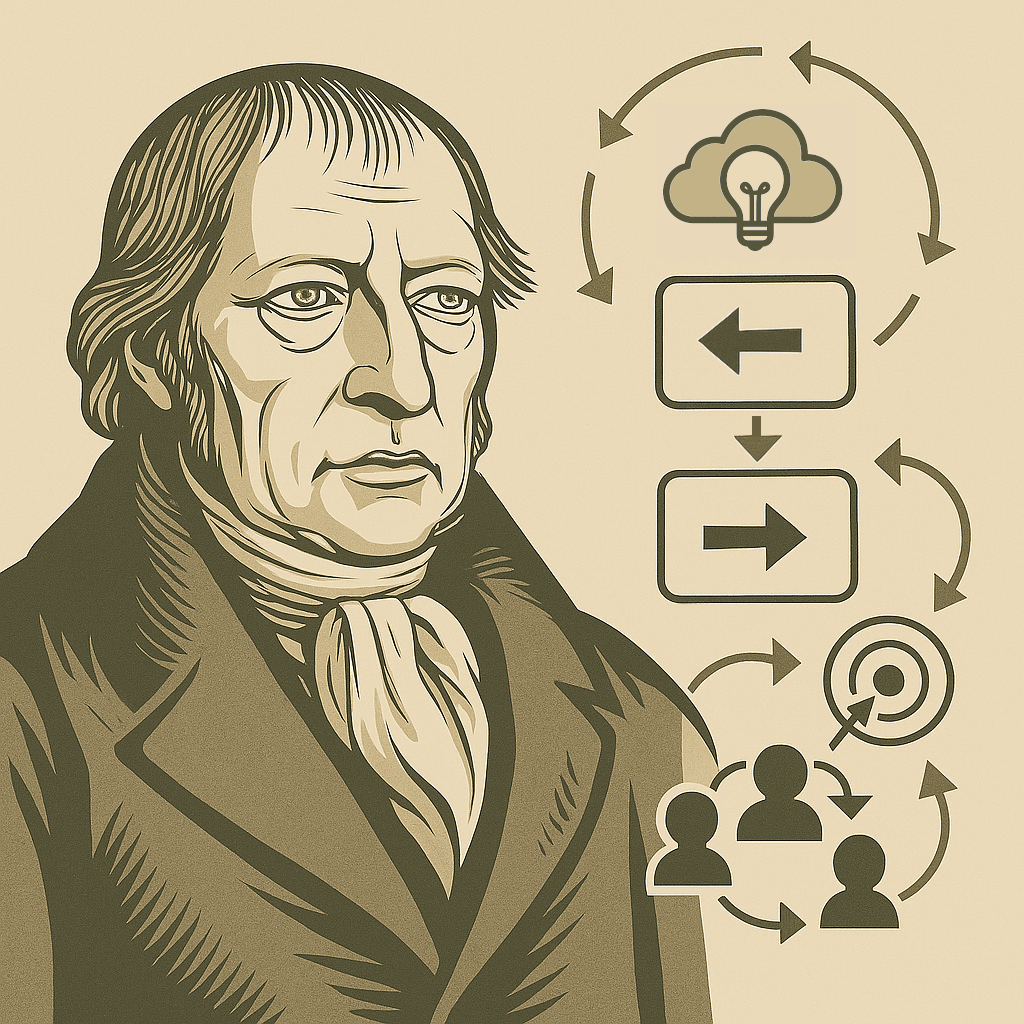Embracing Contradictions: Hegelian Dialectics and Theory of Change

Hegelian Dialectics and Theory of Change
In strategic planning, especially when tackling complex social and systemic challenges, linear models often fall short. Most organisations rely on traditional Theory of Change frameworks, assuming that a planned intervention will lead to predictable outcomes. However, real-world change is far more dynamic, often shaped by conflicting assumptions and unpredictable forces.
Hegelian dialectics offers a more responsive approach. By embracing contradictions rather than avoiding them, organisations can create adaptive, continuously evolving strategies that refine their assumptions over time. Dialectical reasoning offers a process to strengthen Theory of Change models, though it is not without challenges when applying this framework and integrating it into strategic decision-making.
Dialectics as a Foundation for Refinement
At its core, Hegelian dialectics is a structured method of problem-solving through contradictions:
- Thesis – The initial assumption or belief driving decision-making.
- Antithesis – The contradiction or opposing perspective that challenges the thesis.
- Synthesis – A refined, adaptive strategy that incorporates insights from both thesis and antithesis.
It’s important to note that Hegel himself would likely have disputed this formulation, as his dialectical method is far more nuanced. However, this three-step process serves as a practical simplification, making his complex philosophical approach more accessible and applicable to problem-solving and strategic refinement.
Unlike static strategic models, the dialectical process ensures that organisations are constantly refining their understanding, creating a Theory of Change that evolves with real-world complexities rather than being constrained by rigid assumptions.
Applying Dialectics to Theory of Change
Step 1: Define the Thesis (Your Core Assumption)
The first step in building a Theory of Change is to define the core assumption about how an intervention will drive impact. This is often taken as the starting point for strategic planning, but in a dialectical model, it is viewed as only the first iteration of the truth.
💡 Example Thesis: “Increasing access to education will improve employment rates.”
Step 2: Identify the Antithesis (Contradictions & Challenges)
Instead of assuming this thesis is universally valid, organisations should actively seek contradictions - factors that challenge its logic or expose gaps in reasoning. This may come from data analysis, stakeholder feedback, or real-world case studies.
💡 Example Contradiction: “Access alone doesn’t guarantee employability - social and economic factors also play a role.”
Once contradictions are detected, decision-makers engage in structured dialogue to refine their strategy, avoiding the trap of oversimplified cause-effect thinking.
Step 3: Synthesise a More Adaptive Strategy
Rather than discarding the initial assumption, dialectical refinement leads to a more sophisticated, nuanced solution. The refined theory accounts for contradictions, allowing the strategy to evolve dynamically.
💡 Example Synthesis: “Access to education must be combined with mentorship and skill-building to ensure employability.”
This continuous refinement cycle ensures that a Theory of Change does not remain static. Instead, it evolves through real-world learning and contradiction resolution.
Digging Deeper
The same dialectical approach can refine strategy, innovation, and ethical decision-making even in smaller, more focused challenges.
Take the example of education and employment outcomes. A commonly accepted premise - "Graduates from accessible education programs gain skills that meet job market demands, leading to higher employment rates." - assumes that access alone guarantees successful employment. However, this view is countered by the argument that structural job market inequalities, automation, and mismatched curricula may limit employment gains. These contradictions reveal that education must evolve continuously to remain relevant.
Through synthesis, a more refined perspective emerges: "A dynamic education model that integrates evolving industry needs, systemic equity measures, and continuous learning pathways ensures meaningful employment outcomes." This approach acknowledges that education must be adaptive, shaped by economic and technological shifts, ensuring graduates can navigate emerging challenges with resilience and relevance.
More broadly, dialectical thinking can be applied to all elements of a Theory of Change, systematically challenging the assumptions embedded in outcomes, activities, and resources necessary for achieving impact. By critically engaging with contradictory perspectives, we sharpen our understanding of the problems we aim to solve, refining the most effective pathways toward sustainable solutions.
Challenges of Using Hegelian Dialectics in Strategy
While the dialectical approach is powerful for refining theories, it comes with unique challenges:
- Complexity & Abstraction - Some decision-makers find dialectical refinement too philosophically dense, making it difficult to apply in practical strategy development.
- Risk of Overcomplication - Constant refinement cycles may slow down real-world action.
- Difficulty Measuring Impact - Dialectical evolution focuses on conceptual change making impact tracking less straightforward.
- Paralysis by Analysis - Organisations may overanalyse contradictions instead of taking decisive steps.
- Funding Model Conflicts -Many funding bodies expect predictable, linear progress, whereas dialectical refinement introduces dynamic evolution.
Making Dialectical Refinement Actionable
To mitigate these challenges, organisations can apply the following strategies:
✔ Simplify Complexity - Use clear language and visual models to explain contradictions and refinement.
✔ Prevent Overcomplication - Set decision limits, ensuring refinements do not delay execution.
✔ Measurable Indicators - Track contradiction resolution using strategic impact KPIs.
✔ Structured Refinement Cycles - Avoid endless iterations by setting clear decision-making milestones.
✔ Funding Alignment - Present dialectical refinement as a strength, showing how adaptive models ensure long-term success.
Conclusion: The Future of Adaptive Strategy
By incorporating Hegel’s dialectic into Theory of Change models, organisations can move beyond static planning, continuously refining their assumptions and improving their impact strategies. Whether in social policy, business strategy, or governance, contradiction-driven refinement ensures that decisions align with reality - not rigid predictions.